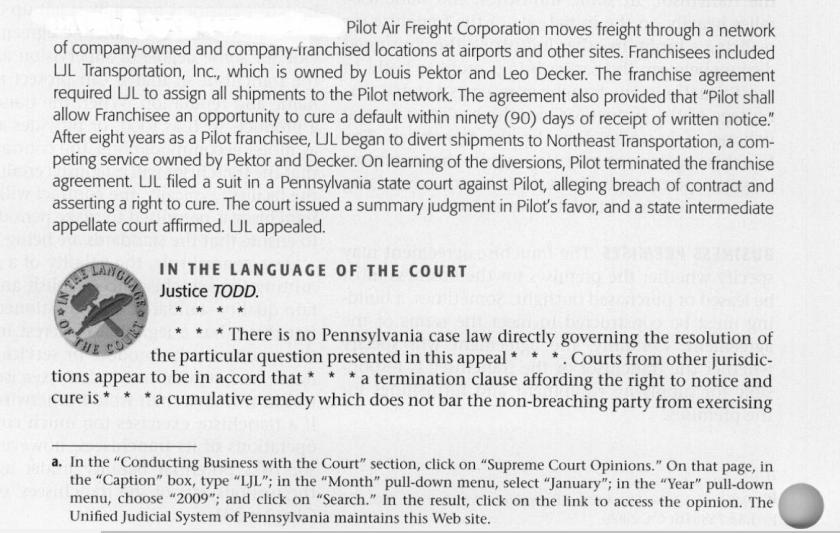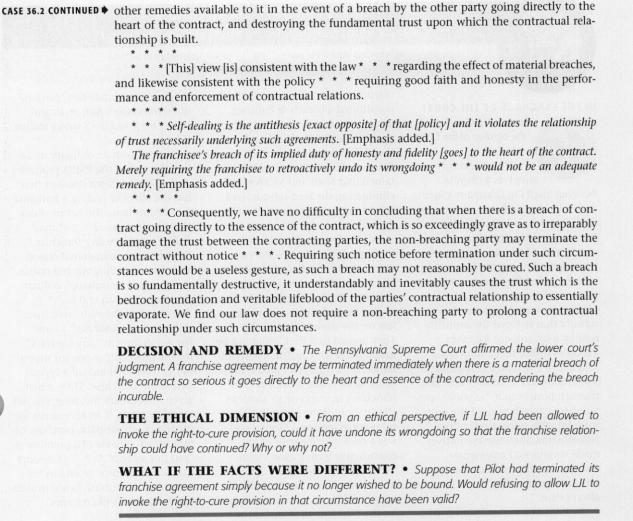Answered step by step
Verified Expert Solution
Question
1 Approved Answer
Pilot Air Freight Corporation moves freight through a network of company-owned and company-franchised locations at airports and other sites. Franchisees included LJL Transportation, Inc.,


Pilot Air Freight Corporation moves freight through a network of company-owned and company-franchised locations at airports and other sites. Franchisees included LJL Transportation, Inc., which is owned by Louis Pektor and Leo Decker. The franchise agreement required LJL to assign all shipments to the Pilot network. The agreement also provided that "Pilot shall allow Franchisee an opportunity to cure a default within ninety (90) days of receipt of written notice!" After eight years as a Pilot franchisee, LJL began to divert shipments to Northeast Transportation, a com- peting service owned by Pektor and Decker. On learning of the diversions, Pilot terminated the franchise agreement. LJL filed a suit in a Pennsylvania state court against Pilot, alleging breach of contract and asserting a right to cure. The court issued a summary judgment in Pilot's favor, and a state intermediate appellate court affirmed. LJL appealed. LANGUA LENT MA OF S IN THE LANGUAGE OF THE COURT Justice TODD. THE There is no Pennsylvania case law directly governing the resolution of the particular question presented in this appeal* * *. Courts from other jurisdic- tions appear to be in accord that* * * a termination clause affording the right to notice and cure is* * * a cumulative remedy which does not bar the non-breaching party from exercising a. In the "Conducting Business with the Court" section, click on "Supreme Court Opinions." On that page, in the "Caption" box, type "LJL"; in the "Month" pull-down menu, select "January"; in the "Year" pull-down menu, choose "2009"; and click on "Search." In the result, click on the link to access the opinion. The Unified Judicial System of Pennsylvania maintains this Web site. CASE 36.2 CONTINUED other remedies available to it in the event of a breach by the other party going directly to the heart of the contract, and destroying the fundamental trust upon which the contractual rela- tionship is built. *[This] view [is] consistent with the law. *regarding the effect of material breaches, and likewise consistent with the policy requiring good faith and honesty in the perfor- mance and enforcement of contractual relations. .. * Self-dealing is the antithesis [exact opposite] of that [policy] and it violates the relationship of trust necessarily underlying such agreements. [Emphasis added.] The franchisee's breach of its implied duty of honesty and fidelity [goes] to the heart of the contract. Merely requiring the franchisee to retroactively undo its wrongdoing * * would not be an adequate remedy. [Emphasis added.] *Consequently, we have no difficulty in concluding that when there is a breach of con- tract going directly to the essence of the contract, which is so exceedingly grave as to irreparably damage the trust between the contracting parties, the non-breaching party may terminate the contract without notice. *. Requiring such notice before termination under such circum- stances would be a useless gesture, as such a breach may not reasonably be cured. Such a breach is so fundamentally destructive, it understandably and inevitably causes the trust which is the bedrock foundation and veritable lifeblood of the parties' contractual relationship to essentially evaporate. We find our law does not require a non-breaching party to prolong a contractual relationship under such circumstances. DECISION AND REMEDY The Pennsylvania Supreme Court affirmed the lower court's judgment. A franchise agreement may be terminated immediately when there is a material breach of the contract so serious it goes directly to the heart and essence of the contract, rendering the breach incurable. THE ETHICAL DIMENSION From an ethical perspective, if LL had been allowed to invoke the right-to-cure provision, could it have undone its wrongdoing so that the franchise relation- ship could have continued? Why or why not? WHAT IF THE FACTS WERE DIFFERENT? Suppose that Pilot hod terminated its franchise agreement simply because it no longer wished to be bound. Would refusing to allow LIL to invoke the right-to-cure provision in that circumstance have been valid?
Step by Step Solution
★★★★★
3.52 Rating (159 Votes )
There are 3 Steps involved in it
Step: 1
The detailed answer for the above question is provided below From an ethical perspective if LJL ...
Get Instant Access to Expert-Tailored Solutions
See step-by-step solutions with expert insights and AI powered tools for academic success
Step: 2

Step: 3

Ace Your Homework with AI
Get the answers you need in no time with our AI-driven, step-by-step assistance
Get Started


